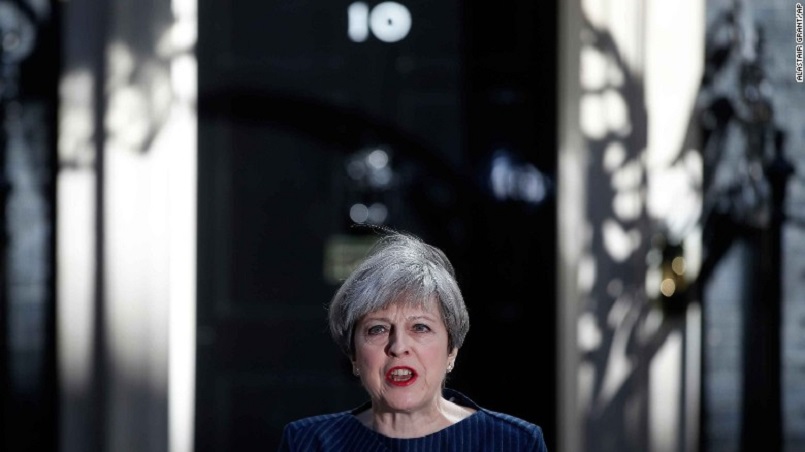
British Prime Minister Theresa May has stunned the UK political world by calling for an early general election, seeking a stronger mandate in talks over leaving the European Union.
In an unexpected statement at Downing Street, May said she was seeking a vote on June 8, less than halfway through the government's five-year term.
May, who commands only a slim majority in parliament's lower House of Commons, said that a new mandate would strengthen her hand in negotiations in Brexit talks.
Her decision is a reversal of policy -- since taking over as Prime Minister, May had repeatedly ruled out an early election.
A general election would end the attempts of opposition parties and members of the House of Lords to thwart her Brexit plans, she said. "If we do not hold a general election now, their political game playing will continue," she told reporters at Downing Street.
"There should be unity here in Westminster, but instead there is division. The country is coming together, but Westminster is not," she added. "We need a general election and we need one now."
Key developments
- MPs must approve decision to dissolve Parliament part-way through full term.
- Vote will be held in Parliament on Wednesday.
- May had full support of Cabinet and had spoken to the Queen
- Opposition parties say they will not block move to hold election on June 8.
- Theresa May likely to substantially increase her slim majority.
Under legislation introduced by the coalition government led her predecessor, David Cameron, an early election requires the support of two-thirds of MPs in the House of Commons. May said she would move a motion on Wednesday in the in the House of Commons calling for a vote on June 8.
May called on voters to throw their support behind her Conservative Party, adding that "every vote for the Conservatives will make me stronger" in Brexit talks.
The Conservatives only have a small majority in the House of Commons, with 330 of the 650 seats. May is expected to win an increased number -- opinion polls show the opposition Labour Party, led by Jeremy Corbyn, at record low levels.
A Downing Street spokesman said that May had the full backing of her Cabinet on calling the election and that the Prime Minister had spoken with Queen Elizabeth II on Monday.
Opposition welcomes vote
May came to power last July in the wake of the British vote to leave the EU, which led to Cameron's resignation. She has repeatedly said that the decision cannot be reversed, and has pursued a hard line against those who have argued for a phased withdrawal or a loose, continued association with the EU.
But Brexit has divided the House along party lines, and MPs from minor parties continue to oppose withdrawal. There are also divisions within her own party over Brexit strategies.
Corbyn said he would not oppose the call for an election. "I welcome the Prime Minister's decision to give the British people the chance to vote for a government that will put the interests of the majority first," he said.
The May government has also faced resurgent Scottish National Party (SNP), which holds 54 seats.
Scotland overwhelmingly voted to stay in the European Union, and the SNP has demanded a fresh referendum on Scottish independence from Britain.
"The Tories see a chance to move the UK to the right, force through a hard Brexit and impose deeper cuts. Let's stand up for Scotland," SNP leader Nicola Sturgeon said, using a colloquial name for the Conservative Party.
Tim Farron, leader of the Liberal Democrats -- which was battered in the 2015 election and now holds just nine seats in the House of Commons -- said the election was Britain's chance to change direction.
The Liberal Democrats oppose Brexit, and Farron said he would push for as strong an association with Europe as possible -- a so-called "soft" Brexit -- including membership of the EU's free-trade zone, the single market.
"If you want to avoid a disastrous hard Brexit. If you want to keep Britain in the single market, if you want a Britain that is open, tolerant and united, this is your chance," he said in a statement.
"Only the Liberal Democrats can prevent a Conservative majority."
The party said it had gained 1,000 new members in the hour after May's announcement.
Brexit talks loom
May officially began the Brexit process on March 29 by triggering Article 50, the legal mechanism needed to begin the divorce process and officially start talks with the EU.
The negotiations are expected to be tough and will likely take place over two years, though the more complex aspects of Britain's future relationship with the EU could take even longer.
Britain voted in July last year to leave the union after 44 years of membership in a divisive and hotly contested referendum.
